For the believing Jew, the most significant and exalted month of the year is the month of Tishrei, in which the Days of Awe take place. Rosh Hashana, the Ten Days of Repentance (between Rosh Hashana and Yom Kippur), Yom Kippur, Sukkot, Hoshana Rabbah, Simchat Torah - each of the days of Tishrei are hugely emotionally and spiritually charged for the Jewish people. Despite the enormous difficulty and danger of doing so, Jews throughout the generations and even during the Holocaust gave their lives...[Read more]
For the believing Jew, the most significant and exalted month of the year is the month of Tishrei, in which the Days of Awe take place. Rosh Hashana, the Ten Days of Repentance (between Rosh Hashana and Yom Kippur), Yom Kippur, Sukkot, Hoshana Rabbah, Simchat Torah - each of the days of Tishrei are hugely emotionally and spiritually charged for the Jewish people. Despite the enormous difficulty and danger of doing so, Jews throughout the generations and even during the Holocaust gave their lives to observe the mitzvahs of the holiday. In unusual ways, they managed to blow the shofar and hold prayers in the camps, and despite hunger and weakness - to fast on Yom Kippur. There is also evidence of sukkahs built in the camps.
A Mother's Prayer
A Mother's Prayer
It was two days before Rosh Hashana 5703 (1942). The bitter rumour spread like wildfire by the residents of the ghetto that the SS and police, armed with light and heavy weapons, were taking up positions around the ghetto lest anyone escape. In the ghetto, the Jews no longer slept; a terrible panic took hold. It was clear to everyone that another cruel aktion (roundup) was stirring and coming upon the battered ghetto.
The Judenrat officers announced that all workers must hand over their work certificates to be stamped by the Gestapo. Those of the workers whose certificates will be signed will be kept alive due to being necessary for the war effort. Crowds of workers gathered around the Judenrat building, and handed over their certificates to be stamped. However, only a small number of people got to receive the certificates - and I was among them - the rest remained without certificates. I returned home late at night.
When I came to the apartment, I saw that everyone was already ready to go to the hiding place. I joined my family and we all entered with great difficulty into a small warehouse full of men, women, and children. The heat and suffocation were terrible. You could hardly breathe. Any noise heard outside increased our fear. The small children were especially carefully silenced so that they wouldn't make their voices heard.
In the early hours of the morning, the children fell asleep, but the adults began saying the Selichot prayers (said prior to Rosh Hashana). I sat near my dear mother, who was muttering the prayers while crying heartbreakingly, and her tears wet the book of Selichot in her hands. I was standing right next to her and I was able to catch fragments of her prayer said with supreme emotion.
Mother closed her eyes and her lips uttered a silent prayer; she begged and asked for mercy. "Our Father in Heaven… I know that we are in great danger. Who knows what will happen to us. If it is my fate, I am ready to die in santification of Your Name… But I am begging you, leave at least a remnant of my family and my children, that at least some trace of us will remain… ". And so her holy and pure lips dubbed the last plea I heard from her mouth, and I will never be able to forget her prayer. "The mother's prayer" said in innocence and with complete faith that the time of her desire had come and her prayer would be fulfilled.
Dawn broke. The men wrapped themselves in their prayer shawls and put on their tefillin. Who knew, maybe this would be their last prayer? The prayer was said with devotion and great intention. I also joined in the prayer, after which I went outside to breathe in the clear air. The rest of the people were afraid to go out, lest something bad happen to them. But I had courage and strength after hearing my mother's prayer which instilled in me faith and hope that I was going to be saved.
And here my foreman, a Jew from the ghetto, appeared in front of me. I spoke with him and he told me that he had just returned from the concentration point in Freedom Square, where the Germans rounded up thousands of Jews for deportation. Those sent were without work certificates, or their certificates had not been approved and stamped.
The Germans signed his certificate, he said, and released him to his own devices. I debated whether I should also go to the square and get a stamp that would save my life, or it might be dangerous to go near there, lest the Germans decide for some reason not to give me a stamp and include me in the shipment.
I returned to my parents to consult with them. After we considered both sides, it was decided that I would go out and that G-d would protect me. With great emotion and from the bottom of their heart, my father and mother blessed me that G-d would make me successful and that I would return in peace. That's how they blessed me again and again. And finally I went out towards the square with the blessing of my parents as they worried about my safety and prayed to G-d to protect me from all harm. They were full of hope that I was left behind and survived this brutal action.
On the eve of Rosh Hashana, two other young men stayed with me in the apartment. Each of us stood in a different corner and prayed a th Rosh Hashana night prayers with broken hearts. We cried and prayed, we prayed and cried.
The first day of Rosh Hashana. The Germans announced that uninhabited houses would be locked and the entrance to them would be marked accordingly. All valuable furniture and utensils were removed from the houses and from then on entry to these houses would be prohibited. So that our apartment would not be marked and closed, I stayed in the apartment together with the young man who was with me. That's how we stayed at home on the first day of Rosh Hashana. Concentrating on prayer was quite difficult, but we tried to pray and ask G-d with our broken hearts.
The Rosh Hashana prayer was said to the tune that the book of Lamentations is read in on the Tisha B'Av fast day. This was a prayer for the loss of our loved ones who were taken from us suddenly. The prayer "U'Netaneh Tokef" (prayer relating the holiness of the day and "who will live and who will die") had special meaning, when we who are doomed to die pray anyway. "Who will live and who will die, who will be in water and who will be in fire, who will be strangled and who will be stoned…" The prayer is said in a whisper for reasons of caution, but the heart cries out loud. Who knows, maybe in these moments our loved ones are really moaning, suffocating and burning in sanctification of G-d's Name? And us, what will happen to us? We see before our eyes a spectacle how thousands of Jews were holy and pure both in their lives and in their deaths.
Then, in these difficult moments, I suddenly remembered my mother's prayer and the last words of my father, who ordered me to make an effort and be strong and thus stand firm in the fight for life. I poured out my heart like water before G-d and my heart was full of faith and confidence that with G-d's help I would be saved from the abyss of killing and my dear mother's prayer would be fulfilled.
On the second day of Rosh Hashanah, all the Jews concentrated in the buildings near the square were taken out for a train journey. The destination - the Belzec extermination camp… their last journey…
The second day of Rosh Hashanah is the day set for the yartzeit (anniversary of death) of my family members, may G-d abenge their blood and the bllos of all the martyrs from Tarnow.
(A Mother's Prayer - The Holocaust with Complete Faith, Natan Ginzberg z"l)
Yitzchak Klein – Keeping Mitzvot in the Labour Camp (Debrecen, Hungary)

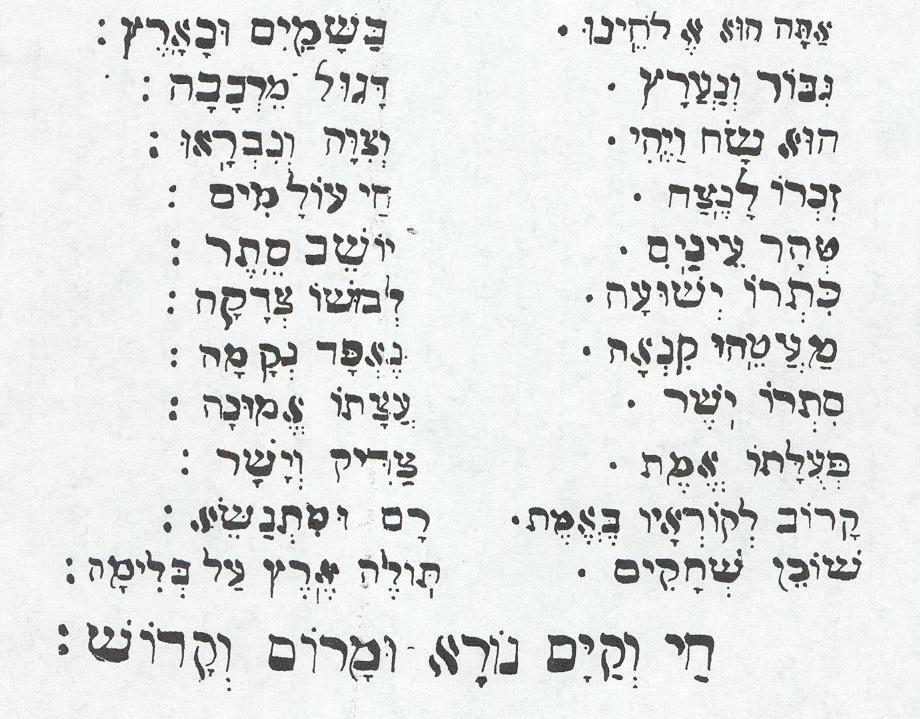
A page of a machzor (High Holiday prayer book) written in a camp
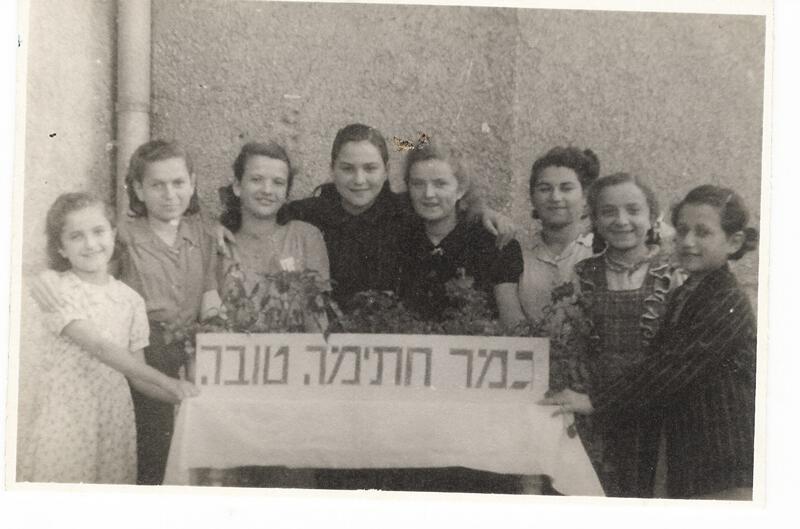
Surviving girls in the Ulm DP camp around a poster for the High Holidays with the message “gmar chatima tova” (a good final sealing in the Book of Life)
Let It Be “The Outcry of Those Who Praise You” as Your Will!...
Let It Be “The Outcry of Those Who Praise You” as Your Will!...
Terrible days were felt by our brothers the Children of Israel throughout the year, every day the curse is multiplied. And despite this, the hearts of Israel will be filled with terror and fear as the High Holidays, Rosh Hashana and Yom Kippur, approach.
How terrible is this place - a camp of labour and slow death, where Manis ended up, by G-d's grace, when he was transferred there from the Auschwitz death camp.
The calendar does not take into account the circumstances, Yom Kippur is imminent. An organized minyan (prayer quorum) is unthinkable. Such a "criminal offense" soon ends on the gallows, or in the best case, being placed against the wall facing the muzzle of the barrel.
There is no machzor (prayer book), not even a prayer shawl, and certainly not a kitel (white robe worn on Yom Kippur by men). Although there is broken hearts! And the great chassidim said that nothing is more whole than a broken heart!…
I knew the prayers by heart - Manis later recounted. I don't know, but all the years I was a prayer leader during the good days at the chassidic prayer house, I used to pray the prayers of the High Holidays by heart… We once heard from the Imrei Emet rabbi, that it is proper to know all the prayers of the year by heart, although we never completed his intention fully...
We were starving to death, yet it was obvious that we would be fasting! It is not possible to spend the holy day just like that; avoiding work was not possible. I stood somewhere near the machine and began to pray from memory… the machine was ready and I was on my own… At first I prayed silently, but slowly I gathered courage and became more and more enthusiastic and almost forgot where I was… In the production hall, the Jewish girls from Hungary were working and they heard the prayer and sobbed, as if they were in the women's section of the synagogue.
The evening cast its shadows and the Neila prayer service (the last set of rpayers on Yom Kippur) was approaching. The Shemona Esrei prayer of the Neila service was said by heart, of course. Words cannot describe the feelings during that prayer on the brink of death.
Suddenly when we arrived at prayer "The Outrcy of Those who Praise you," the German killers stormed in, as they noticed an incomprehensible noise coming from the engine room… "Vos kommt doh foar?!" (What's going on here), screamed the cruel German in a menacing voice. While shouting, he started hitting all the worshipers with satanic cruelty. He even forced us, under his flying whip, to throw our hats off our heads..
Broken and shocked, we had to stop the prayer. What does this say to you? With a broken heart, I turned to my Father in Heaven and said to Him:
"Master of the Universe! Let it be “The Outcry of Those Who Praise You” as Your Will!...
Despite the brutal beatings, the worshipers of the makeshift synagogue were stunned precisely by the intensity of the emotional prayer. They sought with all their heart to express their appreciation to the prayer leader… At the end of the holy day, they approached him and gave him an original tribute: crumbs from their food rations, to "break" his fast… The persecuted Jews declared among themselves that it was precisely his unbridled protest against their destroyers, that encouraged in them the belief and the feeling that their prayers in the Valley of Tears, in the original version of "From the depths I called out to you, Oh Lord" burst forth into the Heavens. And this is exactly what disturbs the rest of the powers of impurity and confuses the devil….
(Tablets and Broken Tablets, Yechiel Menachem Manis Zytnitski)
Bracha Sternberg – A Machzor (Prayer Book) for the High Holidays (Hrubieszew, Poland)

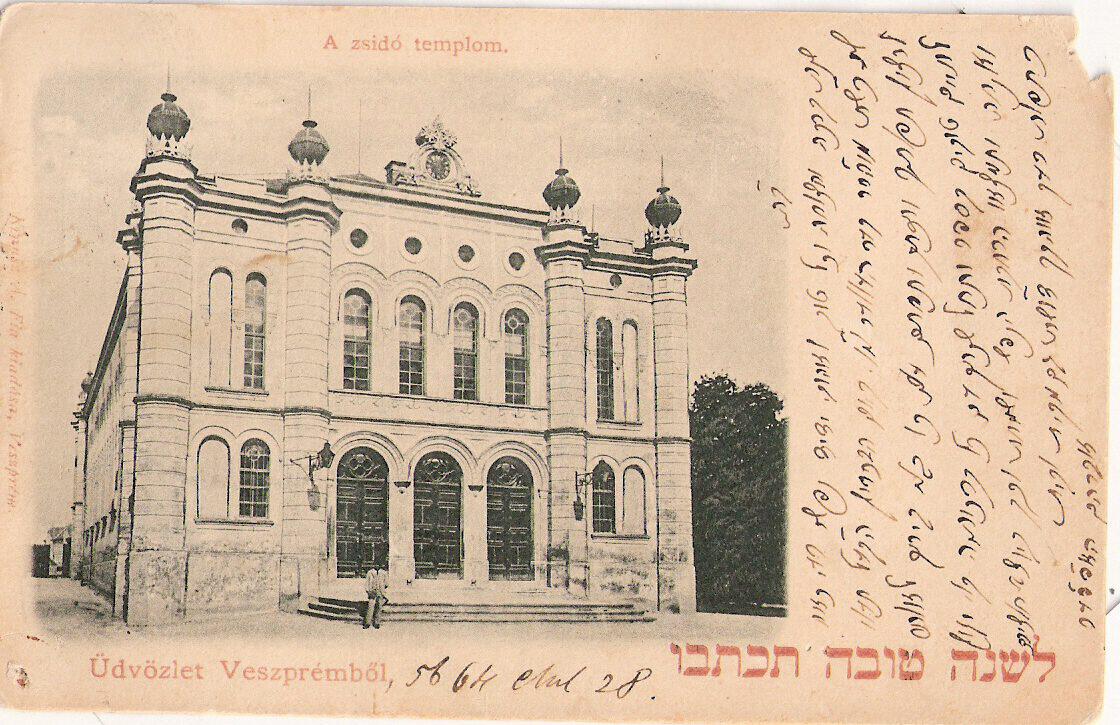
A Rosh Hashana greeting card with a picture of a synagogue in Veszprem, Hungary, on it
And the Great Shofar will be Blown, and A Still Small Sound will be Heard…
And the Great Shofar will be Blown, and A Still Small Sound will be Heard…
On Rosh Hashana 5707 (1944) after the daily roll call, the head of the barracks announced in the name of the Satmar Rebbe that after the morning prayers, the Rebbe would blow the shofar in the camp yard. The news made waves and caused enormous excitement in all segments of the crowd. At the appointed time, the Rebbe went out to the yard - where he was almost never seen, because he always stayed in his barracks. Most of the camp's residents had already died in their places, their heads covered with handkerchiefs or sheets of paper, and everyone felt the ascention of souls. In the silence that remained with the Rebbe's appearance, the blessings were recited and the Rebbe began to blow the shofar, and then we saw before us an unusual and unique scene.
From all the camps around us, which the sound of the shofar reached, men and women came running and approached the fence that separated the camps, to listen to the unbelievable wonder and hear the vibrating sound of the shofar.
The silence was absolute! The holy situation shook hearts. Blowing a shofar?! Here in Bergen-Belsen?! The Dutch and citizens of other countries who were in a camp far away from us, stood as if petrified by the barbed wire fences and did not move for a long time after the blasts. Maybe they were hoping to hear the blasts during the Mussaf prayer as well, but the Germans - who suddenly remembered their high status - started barking like dogs and shouted for us all to disperse. Their screams brought us all back to bitter reality.
The next day, the shofar blowing did not take place in public. It can be assumed that because of the danger, it was decided to do it only in the Rebbe's barracks. Mr. Mor from Bnei Brak - who was with his family among the train passengers - told us that public prayer, like any gathering, was forbidden in the camp, and the prayers were held only in the Rebbe's barracks with a limited number of worshippers. The worshipers would change according to their turn; one would exit and another would enter.
The shofar was in the possession of one of the Dutch prisoners, and the knowledge of its was probably told over by one of the kitchen workers who were all Dutch, and this is how it was lent to the Rebbe. The owner of the shofar received a suitable payment in cigarettes.
A small Torah book was brought by someone from Budapest. The Rebbe's prayers and shofar blasts made a great impression on all the worshipers. Everyone felt a sense that his prayer, coming from his broken heart, touched the Heavens and opened the gates of mercy, and it was this that worked towards our liberation. (Mr. Mor's testimony)
(Words of Salvation: The Miraculous Rescue of Rabbi Yehoshua Menachem Erenberg z"l of Krakow's Family)
Natan Tzvi Baron – Elul in Telz

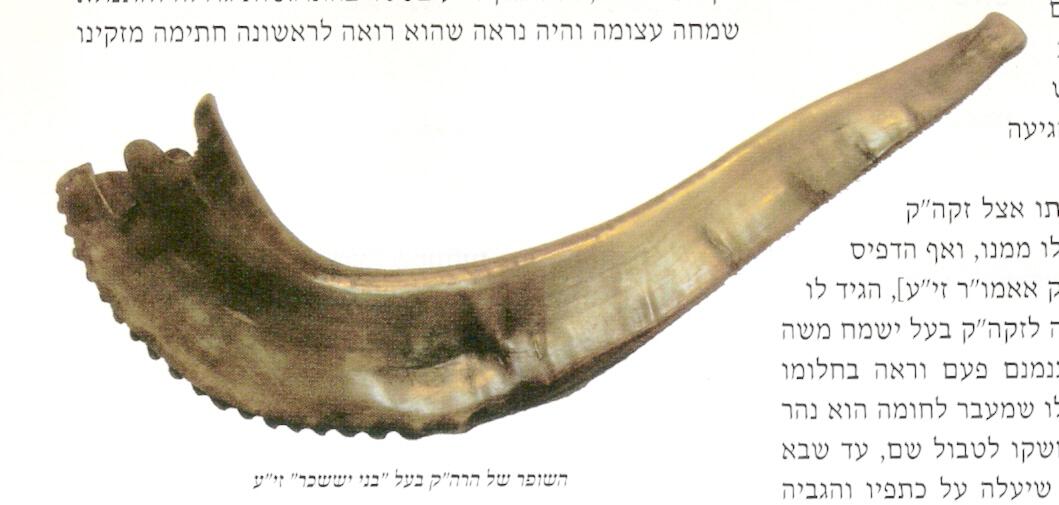
The shofar of the Dinover Rebber, Rabbi Tzvi Elimelech Schapira
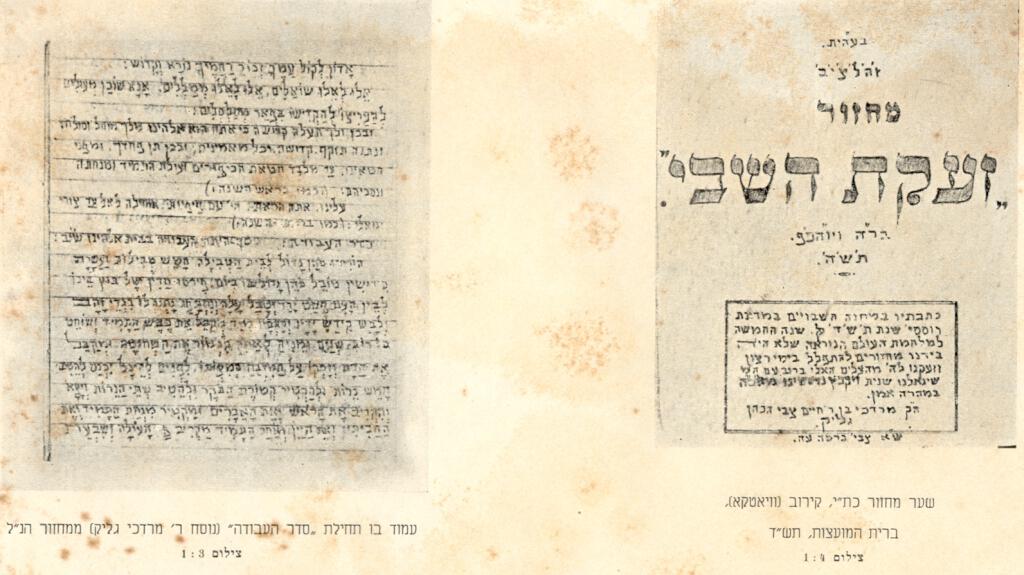
A handwritten page from the Rosh Hashana and Yom Kippur machzor (prayer book) “Za’akat HaSevi” (the cry of captivity)
Jewish Women in the Augsberg Camp – Yom Kippur 5704 (1943)
Jewish Women in the Augsberg Camp – Yom Kippur 5704 (1943)
One of the things that amazed me greatly during my difficult exile in the various camps during the years of the war was the strength of faith and the confidence of a group of women and girls who did not lose the image of their Jewish soul in the highest of difficulties that could be imagined, in the concealment within the concealment, when darkness covered the land, and it seemed, G-d forbid, as if the world had no Master . Their spirits were not broken, and they always had on theri lips "Baruch Hashem" (thank G-d) or "B'Ezrat Hashem" (with G-d's help), at every step. This belief, which inspires wonder, ensured that they said the Shema prayer every night.
It was also a great surprise for me to be able to prove that inside the Valley of Tears they knew when the Israeli holidays fell. How they obtained this information I do not know, but accordingly they tried to preserve it as much as possible, even in a symbolic manner.
I remember that on the eve of Yom Kippur, there was a whisper among the girls about the holy day, Yom Kippur, which fell that night. When I heard this, memories of my native town on this exhalted day, as well as the atmosphere and preparations and holy vines, floated and rose in my spirit. Like a daydream, I remembered the radiant figure of my father and mother, how they would prepare in prayer and supplications for the day of forgiveness and atonement with the upliftment of the soul, what a grand scene it was in the evening when my father, choked with tears, blessed the family members and went to his prayers dressed in splendor in the white kitel (robe) and wrapped in his prayer shawl. How sad my heart is that as a sick slave, I am forced to desecrate the holy and exalted day with physical work, humiliated and despised, instead of fasting and praying in the synagogue. Much to my astonishment, I heard that the group of charedi (highly strict Orthodox) women who grew up on the values of the Torah and reverence decided with the strength of their spirit that they would also fast here, in the Valley of Tears, on a lawful day of fasting. The organizers spoke with the head cook and asked him that due to the fasting of Yom Kippur beginning in the evening, they ask him not to serve the evening meal. This request was made with great dedication and self-risk, both from the responsibility of returning after a day's work, exhausted and hungry, without eating during the day preceding the fast, and continuing to refrain from eating at all until the next evening, which in itself is unbearably difficult, and from the personal responsibility of not letting the Nazis commanders know about it, because otherwise they would have eliminated them immediately.
The head cook, when he heard their request, announced that he was not opposed to it, only on the condition that all female inmates of the camp unanimously agreed to the matter and would not ask for food or complain about him, because otherwise he would face a bad and bitter fate.
The girls took command, and after soulful conversations with the other female prisoners, the Jewish girls agreed to fast and keep the sanctity of the holy day. Indeed, when we returned in the evening exhausted from work and the hunger and thirst that tormented us, our mouths were filled with satiety from the brave decision not to eat and drink in honor of the holy day in which G-d atones for the transgressions of the Jewish People. However, my excitement was intensified by the mitzvah that caused another mitzvah, because I was sure that the next morning, because of the oppressive hunger and the oppressive thirst and the physical weakness, the women would not risk nor eat, and they would all go to work while completely fasting! Therefore it turned out that we all fasted together for two whole days, from the morning light of the 9th of Tishrei until the evening of Yom Kippur. In this way the name of the Almighty was sanctified and the light of G-d was raised in love, and even though it seemed as if G-d was punishing His children, His children did not lose their devotion to Him and did not deviate from the straight path, on the contrary, at the height of difficulty, they adhered to His commandments.
When I tell this today, I think about and imagine in retrospect the sequence of events. In the terrible situation I was in then, thin and worn, barely skin and bones, how could I? How could I have done that? How is it that instead of worrying about a slight improvement in living conditions, to lighten the workload a little, in these difficult moments there were prayer and fasting for two days?
I am strengthened by the words of the verse that come to my lips, that King David wrote in the Book of Psalms: "And my haters shall see and be ashamed."
(Remember What Was Done to Miriam - Yosef Katz, published by Ganzach Kiddush Hashem)
Menachem Mendel Brickman – The Sound of the Shofar in Auschwitz (Pabianice, Poland)

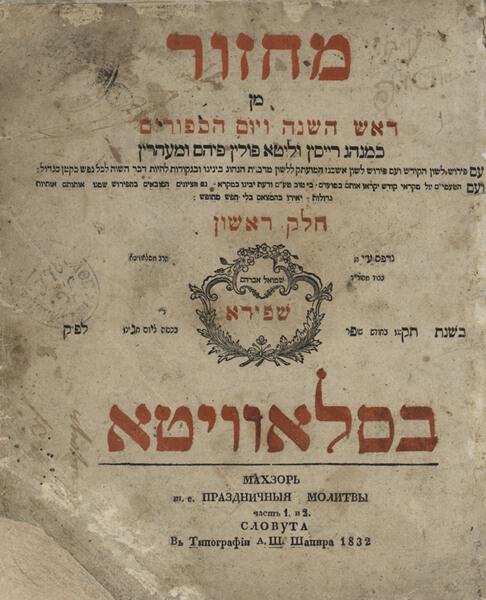
The opening page of a machzor (prayer book) for Rosh Hashana and Yom Kippur
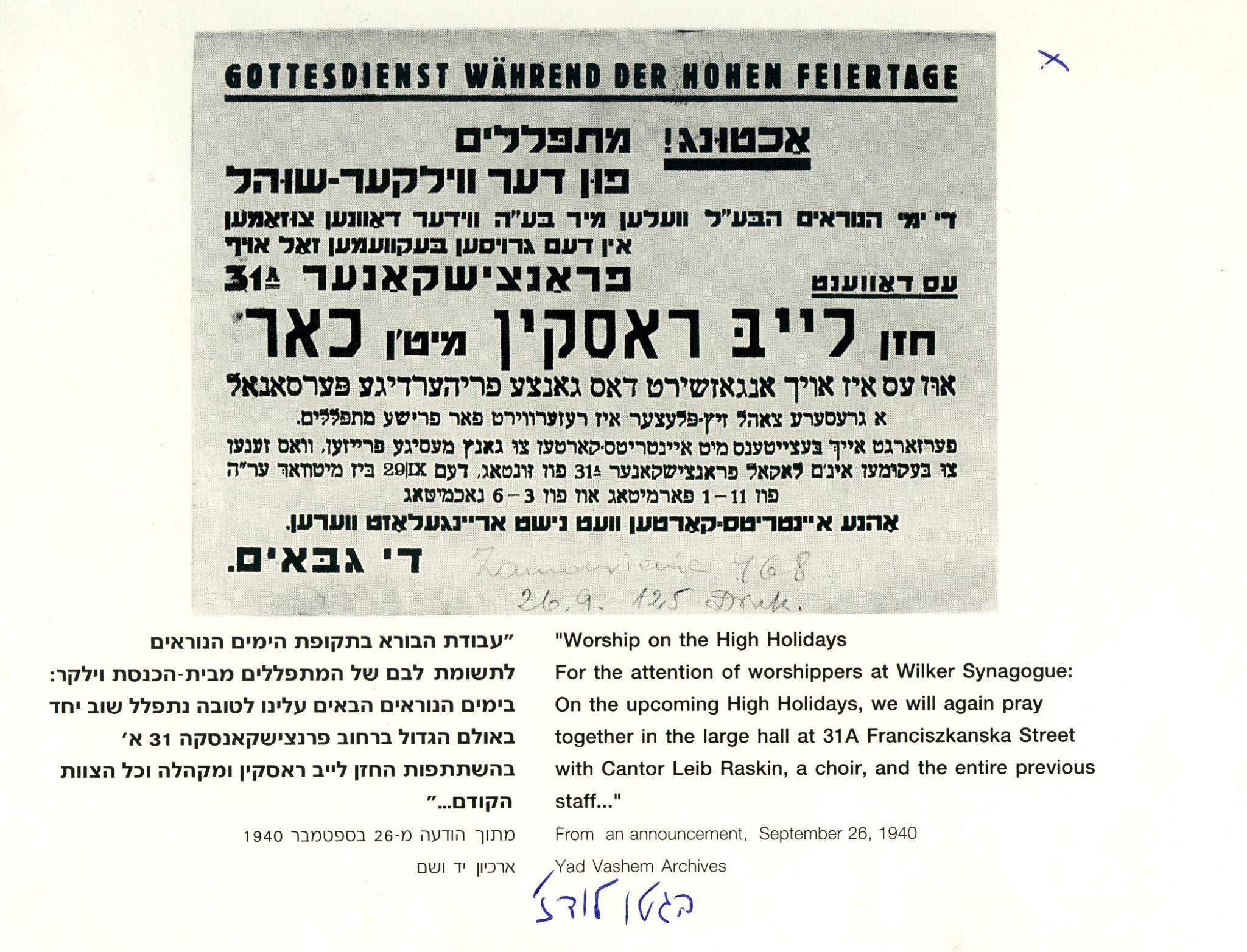
An announcement in the Lodz Ghetto stating that Cantor Leib Raskin and his choir will participate in the High Holiday prayer service
Shmuel and Mordechai Basch – Yom Kippur in the Children’s Barrack in Auschwitz (Spinka, Romania)

“Who Hears the Blows of the Nation of Israel” in a Monastery
“Who Hears the Blows of the Nation of Israel” in a Monastery
Baruch and I arrived in the middle of Tammuz 5705 (Summer 1945), on a US Army Medical Corps train, from Leipzig in Germany to Maastricht, the southernmost city in the Netherlands. The authorities admitted us to temporary hospitals; each of us was admitted to a different hospital. I heard that Baruch's condition was very serious, and after about a month, I was able to move to the hospital where he was lying. He weighed less than twenty kilos, a body without flesh. This hospital had a dedicated team of doctors and nurses, but it was established in the wing of a seminary for Jesuit priests, that is, it was a monastery where priests from the Jesuit order, a zealous sect of Catholic Christians. Officially, the hospital did not belong to the monastery, but three priests were sent on behalf of the institution's management to preach Christianity among the sick, most of whom were Dutch gentiles who had returned from forced labour in Germany. The priests were especially interested in the Jewish patients, helped them, and tried to influence them to convert to Christianity: " You have suffered enough", "You deserve to live a quieter life", "You have come to understand that the Jewish people will suffer until they recognize the truth," "Here we offer you everything, studies and a secure future" etc...
About two months after liberation, I was able to get out of bed again. The priests helped me in my first steps. The conversations between us mostly revolved around the subject of the Christian religion. They invited me to visit the church in the building, but I refused.
Five months passed since liberation. We managed to get in touch by letters with family abroad and with Attorney De Haas in Utrecht. He sent us, among other things, Chumashim (the books of the Pentateuch). Apart from two friends of Baruch who visited us, we did not see any Jews. It seemed to us that only a few Jews survived the Holocaust.
A few days before Rosh Hashanah, an elderly Jew, Rabbi da-Lievre, appeared at the hospital. He was the cantor and leader Torah reading of the Jews who returned to the Maastricht community. We were happy to see a Jew. He asked how he could help us. I understood that he would not be able to take care of kosher food for us, so I asked him to take care of blowing the shofar on Rosh Hashana in the hospital. He promised that he would take care of it, but added that it would be difficult to blow it in every room. I promised him that I would try to see to it that all the patients who wanted to hear the sound of a shofar would be gathered in one place at the time he would set. I informed the Jewish patients that on Rosh Hashana there would be a shofar blowing in the monastery.
Indeed, on the second day of Rosh Hashana (the first day fell on Shabbat, when the shofar may not be blown) in the afternoon, the Jewish patients were brought on stretchers to a special room. The cantor arrived, and despite his fatigue after the morning prayers and the mussaf prayer, reading the Torah, and blowing the shofar, he returned and blew the shofar for the Holocaust survivors in the hospital. This is how we were privileged to hear the sound of a shofar in the Jesuit monastery, about half a year after the end of the terrible Holocaust.
I heard the blowing of the Shofar in Westerbork, in Bergen-Belsen, and in the Jesuit monastery in Maastricht.
(It Will be Told To Generations, Yona Emmanuel)
Abba Halperin – The High Holidays in Birkenau (Lithuania)

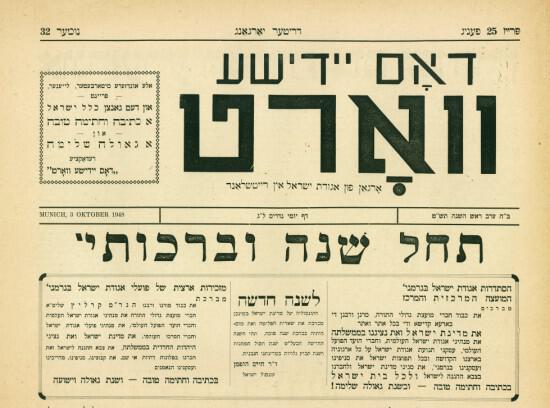
The front page of the Agudath Israel newspaper, “Dos Yiddishe Vort” (The Yiddish Word), published by survivors in Germany, talking about Rosh Hashana
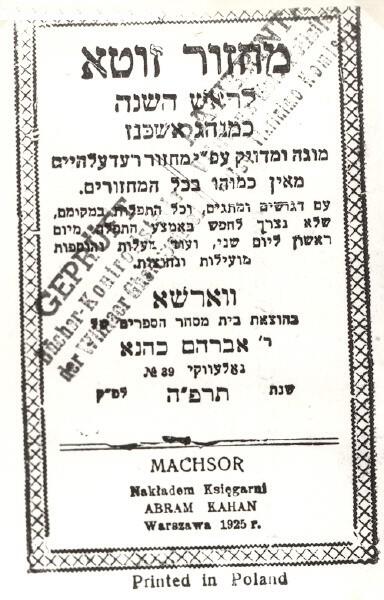
The first page of a Rosh Hashana machzor (prayer book) with the stamp of the ghetto police of Vilna
Shmuel and Mordechai Basch – Blowing the Shofar in Auschwitz (Spinka, Romania)

Yom Kippur 5705 (1944)
Yom Kippur 5705 (1944)
In the days before Yom Kippur, I set aside a "maaser" (tithe) from our food portions, and thanks to this I was able to prepare a satisfying meal for before the fast.
On the eve of Yom Kippur, hundreds of Jews gathered by our barrack for the "Kol Nidrei" prayer; many wanted to fast. My father was the cantor; he prayed while wrapped in a prayer shawl and a "kitel" (white robe). His warm prayer and his voice that evening captivated the crowd, a crowd of poor and hopeless people who were privileged to participate in the "Kol Nidrei" prayer.
A shiver went through the crowd. People cried warm tears.
My father repeated the prayer a second and a third time, each time raising his voice.
"From this Yom Kippur until the next Yom Kippur, let it be good for us…"
And again crying. The question that floated in the air was: Will we really get to make it to the next Yom Kippur? One thing was clear: we will not have another Yom Kippur in the Bergen-Belsen camp. Either we will soon be redeemed from this hell, or…
Rabbi Levison, may G-d avenge his blood, spoke words of encouragement and strength.
And my father prayed: "For Your Name's sake, O Lord, revive me; and in Your righteousness, deliver my soul from distress. For Your sake, our G-d, and not for our sake. See our position, poor and empty. The soul is Yours, and the body is Your work. God, act for Your Name's sake."
My father prayed - begged with great emotion, but managed to continue. It was agreed in advance that my father would be brief by saying the Selichot prayers at the end of the service.
At the end of the prayer, many approached (some of them were not religious) and said to my father "Yasher Koach" (well done) for his moving prayer. In the end, I also approached my father. I shook his hands and thanked him. My father answered me: You deserve all the thanks. Only thanks to the pre Yom Kippur meal you prepared for us, I could pray like this.
(It Will Be Told To Generations - Yona Emmanuel)
Malka Kahane – Rosh Hashana in the Birkenau Camp (Hungary)

Pinchas Winderbaum – Rosh Hashana in Auschwitz

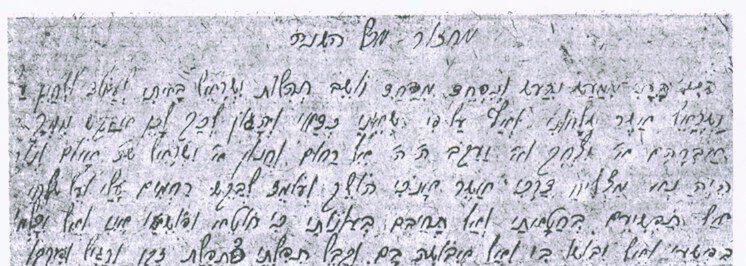
A segment of a handwritten Rosh Hashana machzor (prayer book) written in Soviet Russia
Yitzchak Cohen – Yom Kippur Night in Auschwitz (Salonika, Greece)

Rosh Hashana 5705 (1944) in Auschwitz
Rosh Hashana 5705 (1944) in Auschwitz
The days of Rosh Hashana arrived, Rosh Hashana 5705 (1944) in the Auschwitz extermination camp. Even though we were cut off from the rest of the world, we knew the calendar. At that time I was assigned the role of a "runner", which meant being a liaison between the SS men in charge of the camp and officials inside the camp. I also stood by the camp gate and would open and close it based on the orders I was given. In this position, I also had access to the camp commander, so I dared and asked him for permission to hold a prayer in public on Rosh Hashana. And although the permission was given, it was conditioned on the fact that if someone came from outside we would immediately disperse. That's what we did.
In those days, among the prisoners of the camp was Rabbi Tvi Hirsch Meisels, who served before the deportation as a dayan (Jewish court judge) in the city of Veitzen in Hungary. The rabbi managed to sneak a shofar into the camp, and thanks to him we were able to observe the mitzvah of hearing the sound of the shofar.
When I recall this event today and read these two sentences, I also recall verses from the Book of Shmot (Numbers) describing the scene at Mount Sinai, and I am amazed. We were in hell on earth, in the background the chimneys rose, and here too flames of fire and the smoke of Heaven rose. At that time, the Almighty sat on the throne of judgment, and the angels made haste, and trembled and trembled, and said, "Here is the day of judgment, and in the midst of this great fire, suddenly the sound of a trumpet was heard." However, this time it was not the sound of a trumpet that came down from Heaven to connect them to the earth, but the sound of a trumpet that came up from the earth to connect them to the Heavens. The sound of this shofar rose to the heart of the Heavens, and cried out with a loud noise - Our Father in Heaven, please look and see, your People Israel are being led en masse to a cruel slaughter, men, women and children, and among them the righteous and infants who have not sinned. Did you say to consume your sons? Merciful Father, please have mercy on us - remember the binding of Isaac. Remember that binding that took place on Rosh Hashana on Mount Moriah thousands of years ago. And remember the bindings that are taking place at this time here in the hell we are in. Your childrem, the People of Israel, many of them are being burned to ashes, and that's only because of one single reason - because they are Your children. Our Father in Heaven - have mercy!
Usually the selections were made immediately upon the arrival of the transports to the Auschwitz ramp, but there were additional selections inside the camp as well. This also happened on Rosh Hashana in the year 5705 in the camp where I was.
That Rosh Hashanah, a special selection was made inside the camp. The SS men entered the camp, stuck a stake in the ground and placed a stick at the top of it at a certain height. All the youths, who had arrived at that time from Hungary, were ordered to line up and pass under the stick. Those who were shorter than the stick's height were separated from the others in order to be murdered in the gas chambers, and those whose heads touched the stick remained in the camp. The murderers specifically chose Rosh Hashana to make such a selection as surely from the "Torah" of Der Sturmer (a German weekly that was antisemtism and incitement against the Jews) they learned that on that day it is said, "He (G-d) moves his sheep under his staff." In this special selection, which I was an eyewitness to, several hundred young men were selected for extermination. They were imprisoned in one of the barracks, and were put under strict guard.
Before they were brought to the gas chambers, the boys were held for a day in a closed barracks, and during that time there were people among the prisoners who managed to hide valuables on their bodies, and among them were also the fathers of the boys destined for extermination. The guards of the boys in the barracks pledged themselves to the exact number of those condemned to death. Since there was no second list of the boys, but only their total number was known, there were among the guards those who were willing to free a boy for money, and in return they kidnapped another boy from the camp to complete the number. Rabbi Meisels wrote in the introduction to his book Responsa Mekadshei Hashem (santifiers of G-d's Name) Part 1, that he published after his release from the camps, that on that terrible day a man approached him and told him that his only son was among the young men destined for extermination and that he had the means to redeem him. The father asked if according to the Halacha (Jewish law) he was allowed to do so. The rabbi was frightened and horrified by the terrible question, and despite the many pleas of the questioner, he refrained from answering him. His reasoning was that it was not possible to consult the books, because there were none there, and he also could not consult with anyone on the matter. The man replied that if the rabbi does not tell him that it is permissible to do so, he concludes that there is no permission for it, and he accepts this Halacha upon himself with love and joy. And indeed he did so. He did not redeem the son and put down his plea before the Creator that the act be considered to him like the binding of Isaac our forefather, which also took place on Rosh Hashanah.
Master of the Universe! Is there another nation like your People Israel? Is there a father in the whole world who is ready for such devotion? It is human nature that a father is willing to give his life to save his son. However, refraining from saving the son because this could result in the killing of another child, and this is because the Halacha requires one to do so! There is nothing like it in the world! Only Your sons, who have received your Torah, are able to do so.
(Your Rod and Your Staff, Rabbi Sinai Adler, Published by Ganzach Kiddush Hashem)
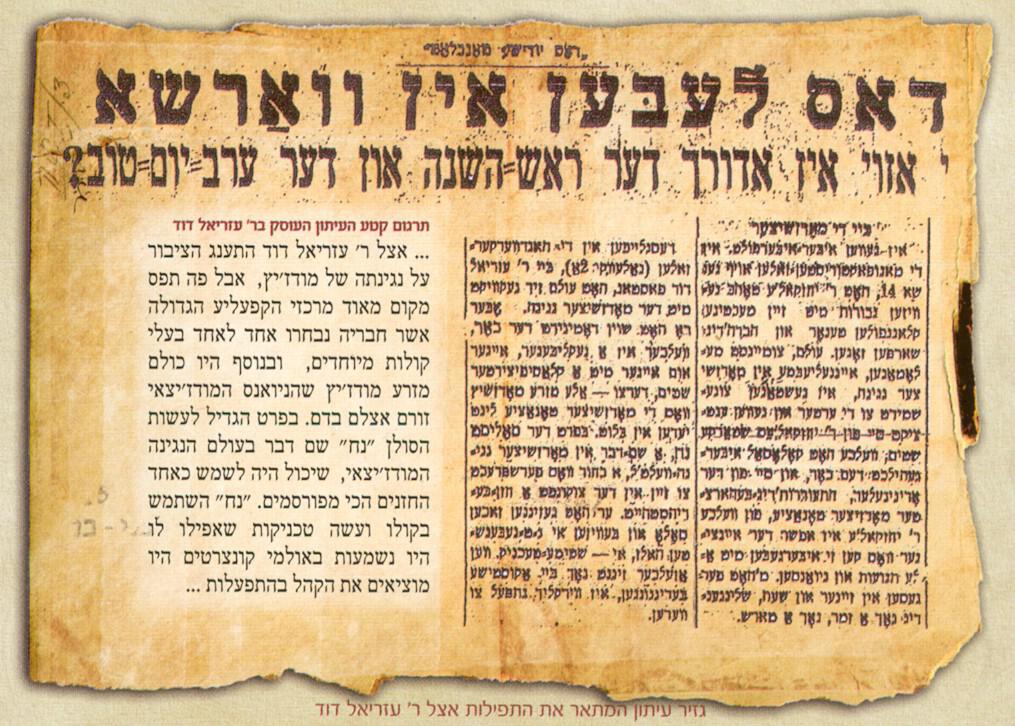
A segment of the newspaper “Dos Yiddishe Togblat” (The Yiddish Daily) featuring a prayer written by Rabbi Azriel David Fastag for the High Holidays
Yoel Schiff – Rosh Hashana under Nazi Conquest (Rudnik, Galicia)

Devorah Berger – The First Rosh Hashana Postwar (Lodz, Poland)

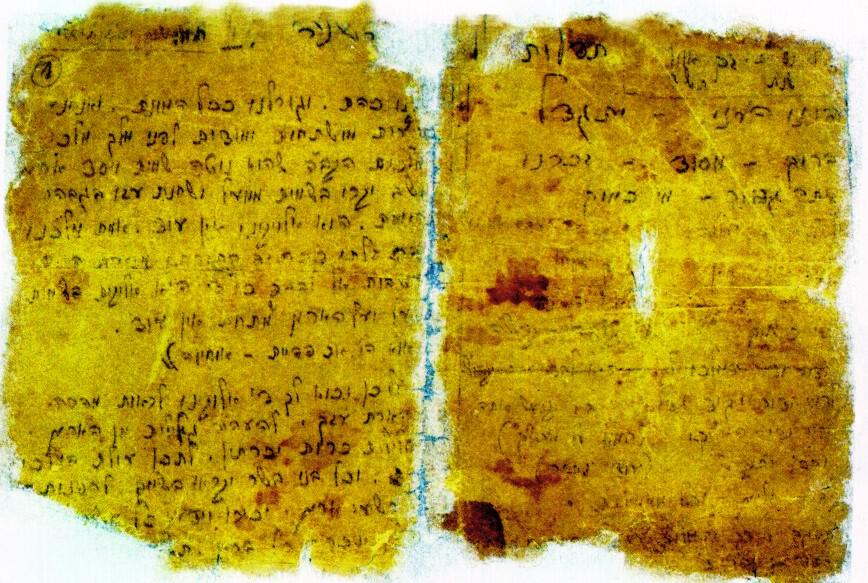
Two handwritten pages from a Rosh Hashana machzor (prayer book) written in the Wolfsberg camp, Austria
Penina Oren – Yom Kippur in Auschwitz (Poland)

Meir Halberstam – Blowing the Shofar in the Cold of Siberia (Sanz, Galicia)

The Night of the “Kol Nidrei” Prayer in the Stutthof Women’s Camp
The Night of the “Kol Nidrei” Prayer in the Stutthof Women’s Camp
I do not know how the idea got to us, but one morning, while we were at work, a rumour spread that the next day was Yom Kippur. That night - The "Kol Nidrei" prayer service, tomorrow - Yom Kippur. The thought ignited our dormant minds
The work continued as usual, the earth that we dug up piled up higher and higher, and the guards looked favourably on the dexterity of the women's hands. The work progressed faster and faster, each woman forced herself to finish the job before "Kol Nidrei". They dug in the ground with vigor and dedication, as if their work depended on their speed. Finally, the day's work was finished. It was done properly, and there was no reason to beat us. We quickly got nito lines of fives, and there was not one among us who was not strengthened and encouraged by the inner excitement.
On our return to the camp, the distribution of bread ended quickly, and this time in an orderly manner. No fights and no friction. No one was concerned if the meager portion of bread was indeed distributed equally. Each one seemed to be filled with kindness, love, and gentleness towards her friends. All of us, even those among us whose homes did not keep the sanctity of Yom Kippur, decided that this Yom Kippur would be observed properly. Therefore, we immediately ate all the portion of bread that was distributed to us, and we were not allowed any for the next day. This is how we started our fast.
Silence, full of majesty and holiness. Yom Kippur! Thousands of Jewish women lay on the rows of piled straw. No one grumbled, no one bullied her neighbors, it was "Kol Nidrei" time.
Suddenly, we heard a ringing sound. It was the voice of the woman who had been appointed as the head of the camp: "My sisters! Today is Yom Kippur, the holiday of love and forgiveness. But it is also the day when everyone is written in the Book of Life or the Book of Death. My sisters, although few of us do not doubt that we are destined for death, we must believe and hope despite everything. With this faith, with this hope, we pray that the next Yom Kippur will see ourselves returning to health, united with our families in our homes."
She didn't have the strength to continue; her voice drowned in moans. Complete silence reigned in the barrack. Then suddenly, with a strange voice, as if coming from deep in the throat, the breaking cry was heard, and all the women burst into moans. They prayed to the Master of the Universe to forgive their transgressions, so that they would be worthy of His mercy and grace. There was complete darkness in the barrack, but in everyone's minds came the sights of their homes, the gray tablecloth on the table, the candles burning in the bright light. A sight chased another sight; men dressed in holiday clotheing saying: happy holidays, happy holidays! Parents watch their children before going to synagogue. Then suddenly the heart-breaking melody of "Kol Nedri" was heard. One by one, the women joined in the eternal melody, the melody of all generations.
(Testimony of Rashka Weiss)
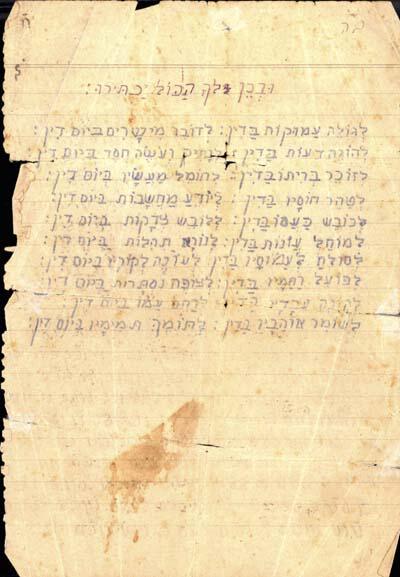
The “U’vechen Lecha HaKol Yaktiru” (and to You everything will be crowned) prayer written by heart in the Bergen-Belsen Camp
Rabbi Yosef Bramson – The Fate of a Shofar (Franeker, Holland)

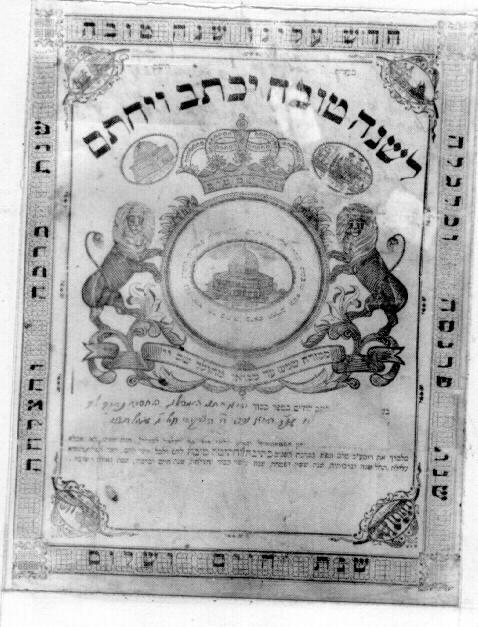
A Rosh Hashana greeting card sent to donors of the Rabbi Meir Baal HaNes charity
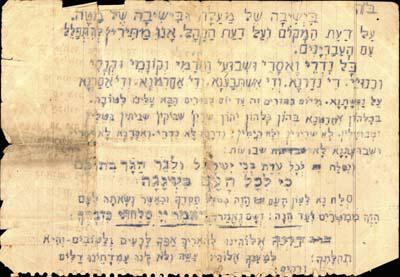
The Kol Nidrei prayer (said on Yom Kippur night) written by memory in Bergen-Belsen
Bella Porius – Rosh Hashana Prayers in the Camp (Senec, Czechoslovakia)

Shulamit Katan – The Holiday Period in Hiding in France (Frankfurt, Germany)

Yaakov Leibowitz – A Handwritten Rosh Hashana Machzor (Prayer Book) (Poland – Siberia, Russia)

The High Holidays 5705 (1944) – Bergen-Belsen
The High Holidays 5705 (1944) – Bergen-Belsen
As the High Holidays of the year 5705 (1944) approached, a feeling of tension and uncertainty prevailed in the camp. How do we pray? Will there be shofar blowing? In order not to disturb the workers returning exhausted from work and asking for rest, my father decided not to pray in the crowded barrack. At first, it was doubtful whether there would be a minyan (prayer quorum), but the news of the recitation of the Selichot prayers quickly spread through the camp, and many came. We stood outside among the barracks, and my father prayed. In the Selichot prayers, it is said "make strong unsteady knees." The words of the plea amazed me. Many prayed together from Selichot prayer booklet: "From your anger return...Remember for us the covenant of the 13th… Listen to our prayer and hear what we are saying… G-d a G-d of mercy, generosity, kindness, and truth, Who bestows kindness upon thousands."
It was a miracle in the camp. One had the Passover Haggadah and another - a High Holiday machzor (prayer book) or a booklet of the Selichot prayers. How? Jews who were sent to the camp took with them the prayer books needed for the coming period; one brought the a Chumash Beraishit (the Book of Genesis) and the Chumash Bamidbar (the Book of Numbers). We brought chumashim (books of the Pentateuch), Mishna books, High Holiday machzors, as well as a booklet of the Selichot prayers, out of the hope that we would stay together.
With the approach of Rosh Hashana, we heard that there were several shofars in the camp, but the wicked ones issued a ban on blowing them. We prayed hastily, without blowing a shofar, and ran to the commander. In those days I worked inside the camp repairing planks. The fact that we were inside the camp allowed me to circumvent the instructions somewhat. We found a shofar blower who had a shofar, the cantor, de Jung, may G-d avenge his blood. He agreed to blow, but he was afraid, and rightly so, lest the SS men wander between the barracks. I agreed to stand in front of the barracks door, "and I looked in each direction and saw that there was no one" (Exodus 2:12). That's how I heard the blowing of the shofar on Rosh Hashana 5705, although not directly from the person who blew it, but from some distance away, at the door of the shack. Only a few heard the blowing of the shofar.
(It Will Be Told To Generations, Yona Emmanuel)
Yitzchak Rosmarin – The Holidays in Siberia (Krasnosielc, Poland)

Miriam Miller – The Holidays in Bergen-Belsen with Leibaleh, son of the Gerrer Rebbe (Lvov, Poland)

Blowing the Shofar in Auschwitz
Blowing the Shofar in Auschwitz
The High Holidays of the year 5705 (1944) were coming, and there were still Jews left in the camp who had the flame of Judaism burning within them. Rosh Hashana awakened them… Rosh Hashanah was coming, they declared again and again, one must prepare for it! A decent place must be found and prepared where prayers could be held, and a shofar and shofar blower found, in order to carry out the holiday properly. Some responded with a shrug of the shoulders, and shook their heads: "Prayer in days like this, and in Auschwitz?" "In Auschwitz, such ideas cannot come to the mind of a sane person, only those who hid within themselves can think of prayer," they argued.
But what a surprise it was to see and prove that not all individuals had the same wish, even though it sounded crazy and had no grip in reality. The rumour about holding Rosh Hashana prayers passed through the barracks by word of mouth. The enthusiasm was common. A number of Jewish kapos were were told about the secret matter, and they promised that they would stand by the right of the Jews who wanted to pray. The lottery fell on a barrack that was not yet finished on the inside; it did not yet have sleeping bunks and the construction of the oven in the middle of it was not yet finished. The kapos were at the ready, in a long chain that stretched from the German headquarters to the barracks, to announce and warn of any trouble that might come. When the signal was given by them - we would have to stop the prayer and disperse immediately. The day arrived. Work and the daily roll call ended, and at at 4 pm, an influx of crowds of Jews was seen past the barrack. Thousands upon thousands crowded the barrack, huddled inside it, and filled it to capacity.
Tears choked our throats, the skies open in the barracks, and the floor became a "sea of tears". So many Jews, it seemed as if the fate had been sealed on their Judaism; they were full of despair and the idleness gave them its signs. Now they all stood crowded and their voices joined the Jewsih voice, sobbing in supplication and emanating from the charred land of Auschwitz…
A Hungarian rabbi served as the prayer leader, who prayed by heart and we all followed him. When the crowd heard the voice of the prayer leader, when he choked with tears, we all burst into stormy tears, and it was a place of fear of G-d.
I don't know from where the shofar came from to the camp and who blew it, but we managed to hear one blast, and then the large crowd had to disperse. From the mouths of the "guards" a message reached the barracks that the Germans had left their headquarters, and we immediately detached ourselves from the emotions surrounding us and hurried to escape from the place.
The next day, we could no longer repeat the act of yesterday, nor on Yom Kippur. The danger increased, the Germans were nervous, and it was dangerous to provoke them by arranging minyans (prayer quorums).
(The Candles That Were Not Extinguished, Mordechai Hakohen Deutscher, published by Ganzach Kiddush Hashem)
Bentzion Weiss – Keeping the Jewish Holidays (Neresnica, Czechoslovakia)

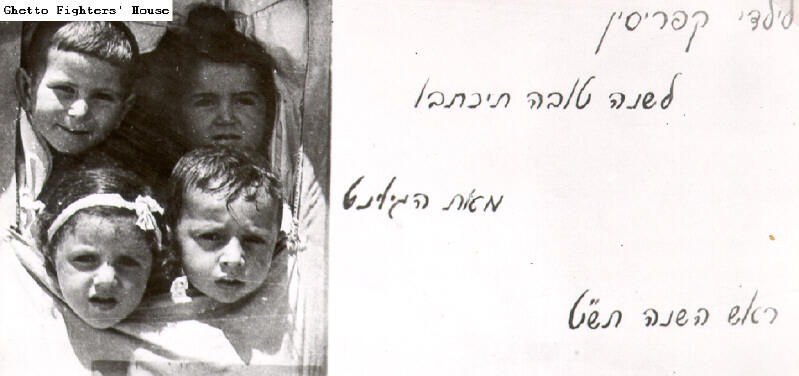
A Rosh Hashana card send by the Joint to the children in the dention camps in Cyprus
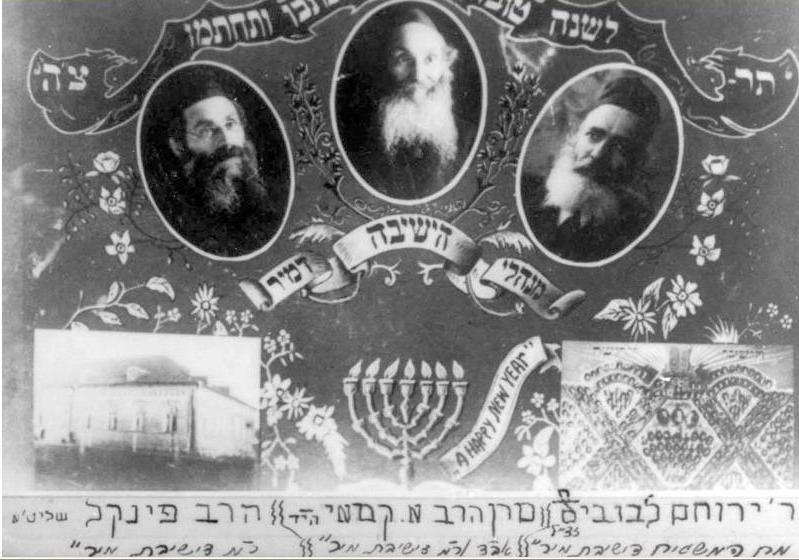
A Rosh Hashana greeting card with pictures of the heads of the Mir Yeshiva, Rabbi Yerucham, Rabbi Kamai, and Rabbi Eliezer Yehuda Finkel
Yehoshua Danziger – A Minyan (Prayer Quorum) on Yom Kippur in the Labour Camp (Tiszalok, Hungary)

Poria Sokal – To Fast on Yom Kippur (Warsaw, Poland)

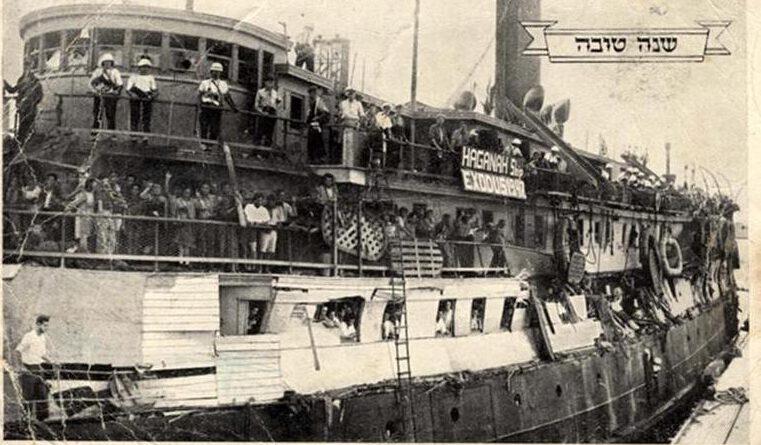
A Rosh Hashana greeting card with a picture of the Exodus ship
Moshe Schnewald – Blowing the Shofar in the Camp (Szarvas, Hungary)

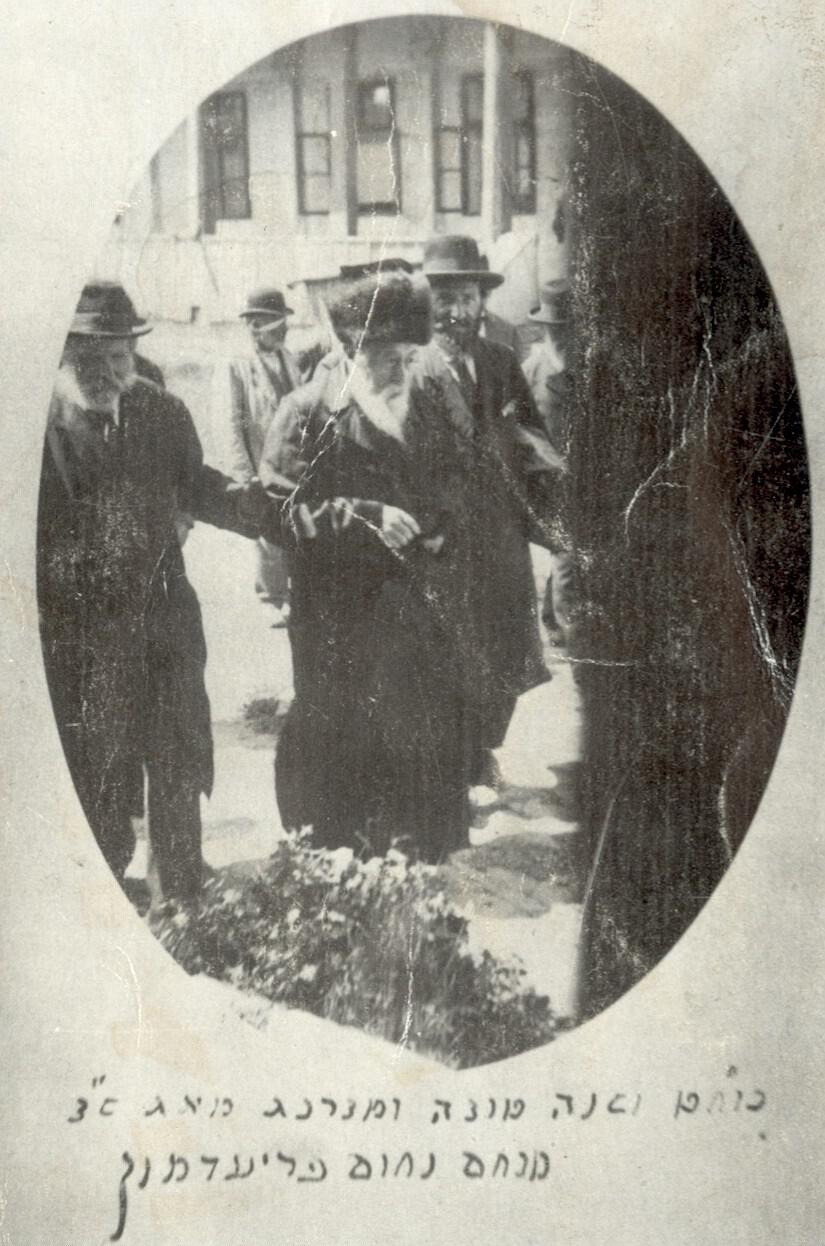
Photo of the Stephanesht Rebbe, Rabbi Menachem Nachum Friedman, with his handwritten new year’s blessing beneath it
Gita Cycowicz – Yom Kippur in Auschwitz (Chust, Czechoslovakia)

The High Holidays in a Quarantine Camp in Germany
The High Holidays in a Quarantine Camp in Germany
The months of Elul and Tishrei were approaching, and despite the difficult trials and sorrowful thoughts that consumed us, we would not despair of mercy, and we hoped for G-d to save us and bring us from darkness into light.
I learned that one of the inmates had a siddur (prayer book), the one and only. I went to him hiding on me a piece of paper that I had found on the street when I went to work, and I copied for myself the Shemona Esrai prayer for Rosh Hashana and Yom Kippur; and on the day of Rosh Hashana we prayed in one of the barracks, without the knowledge of the Germans guards. I said the Shemona Esrai from the handwritten script and all the people, about two thousand, recited it after me in a whisper, tearfully and with hearts breaking into pieces, moanings and whimpers. But we finished our prayer in peace, we hurriedly left for the day's work, and the sorrow we had over our bitter fate of spending the holy days of remembrance among dogs and beasts of prey in human form reached the point of despondency.
On the eve of Yom Kippur, at sunset, they took us out to the stand for "appell" (roll call), and knowing that that day was the eve of the holy day, they delayed us until it got dark, and we didn't have time to eat the meager slice of bread that everyone saved for this purpose. All the people wept a great cry, and the awakening of the soul was immeasurable. We were worried that, G-d forbid, we would not be able to fast and observe the mitzvah of the day properly. On the night of Kol Nidrei (the prayer service held on the eve of Yom Kippur), we prayed in the place where we prayed on Rosh Hashana, and we also gathered on Yom Kippur in the morning, but we didn't have time to finish the prayer, because in the middle of the Shemona Esrai prayer, the killers arrived with weapons drawn in their hands. We tried to escape, but not everyone managed to escape, and those who fell into their hands were beaten to death. We prayed the Ne'ila prayer (closing prayer of Yom Kippur) as a group in a secluded place without distractions, because we were careful that the impure (Germans) would not see us. At the end of Yom Kippur, there was joy in the hearts of all of us that we had the privilege of fulfilling the mitzvot of "fasting for our souls" and I saw then the that the Name of G-d had been sanctified by the Jews, when I saw the dedication of the soul of formerly free Jews, how they tried to keep G-d's mitzvahs and how willing and happy they will to do G-d's will.
(Kindness to Yehoshua, in A Tearful Eye, by Rabbi Yehoshua Greenwald)
Bracha Sternberg – Yom Kippur in Siberia (Hrubieszew, Poland)

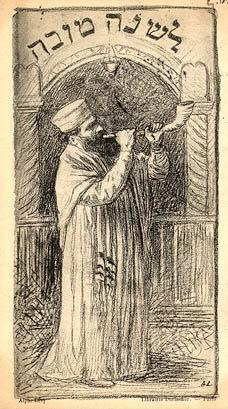
Rosh Hashana card depicting a shofar being blown
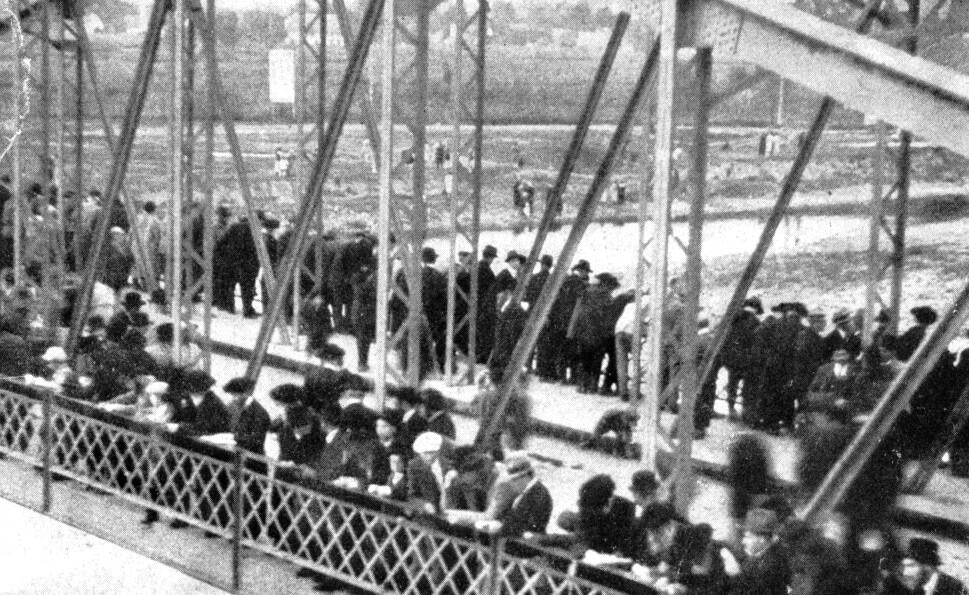
The Jews of Munkasz carrying out the Tashlich ritual on a bridge over a river
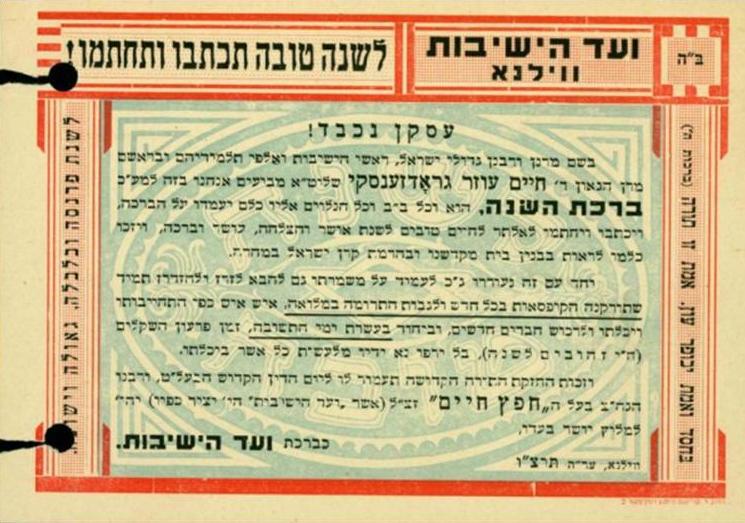
A Rosh Hashana greeting card, including a donation request to the Committee of Yeshivahs in Vilna, headed by Rabbi Chaim Ozer Grodzensky
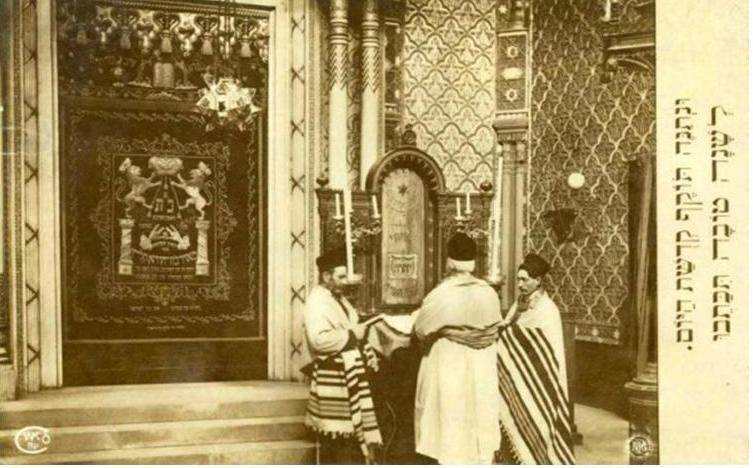
Cantors on the High Holidays
Esther Dawidowicz – The Strength of the Children of Israel on Yom Kippur (Hungary)

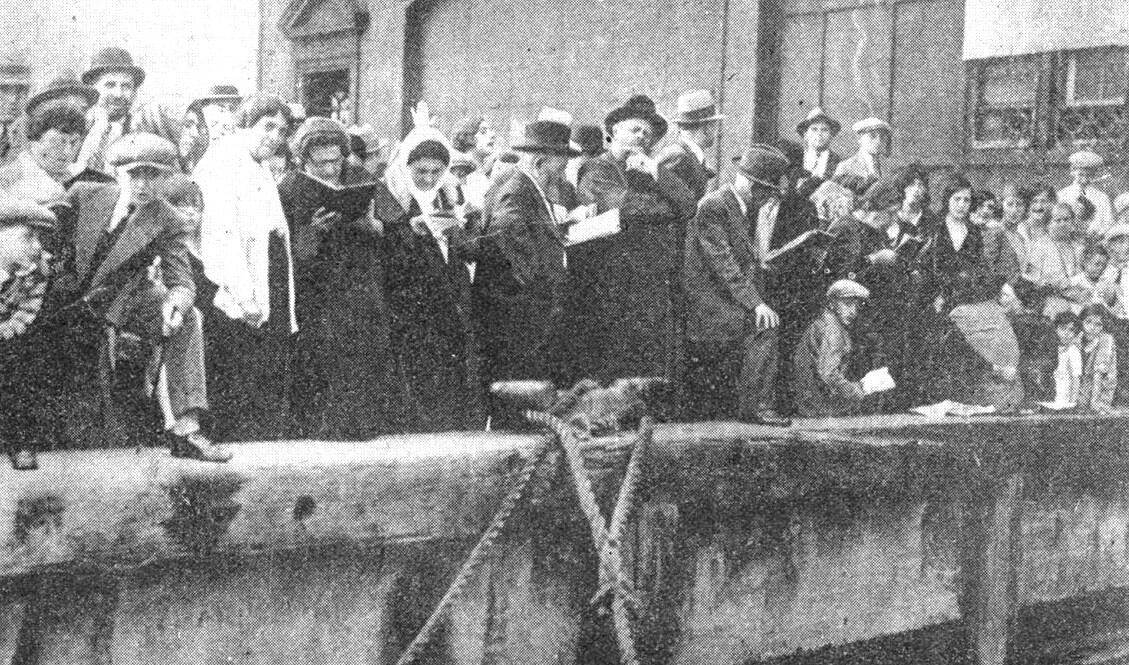
The Jews of Vienna perform the Tashlich ritual on the bridge over the river in the city
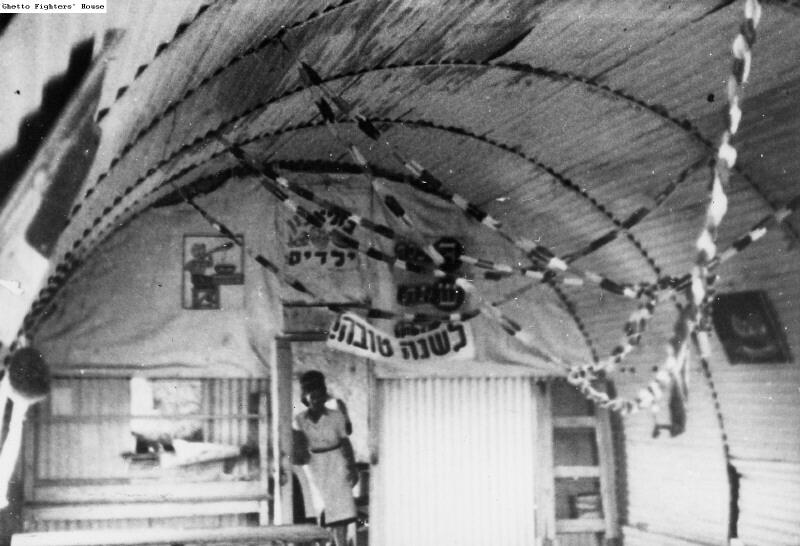
The school barrack in Detention Camp Number 65 in Cyprus, decorated from Rosh Hashana 5709 (1948)
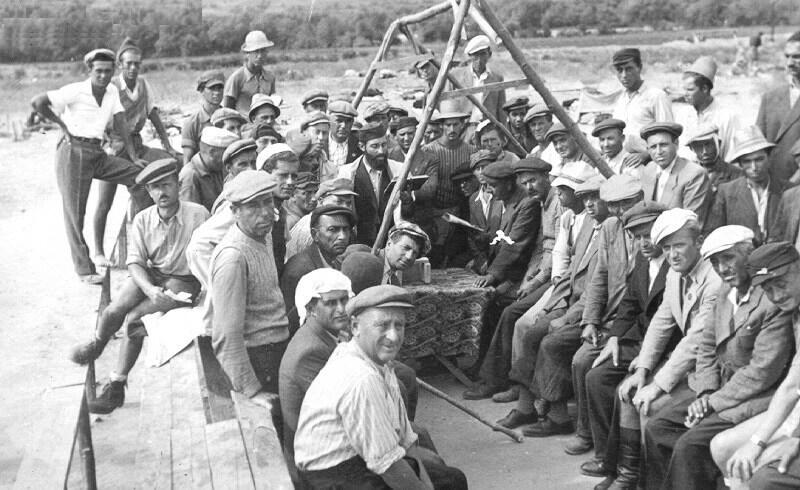
Bulgarian Jews pray on Yom Kippur 5703 (1942) in the Rinoska-Cheshna Camp
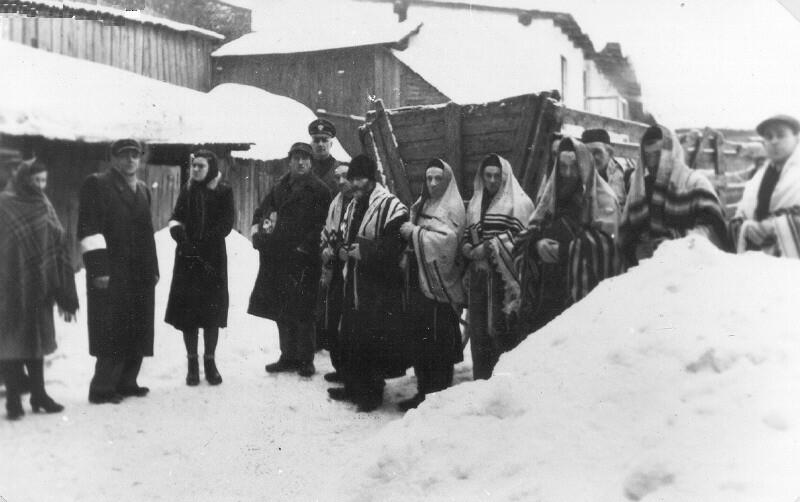
Jews forced out of a synagogue by the Germans, while in the midst of praying on the High Holidays, stand in the snow, wrapped in their prayer shawls
Yehoshua Eibishitz – Work on Yom Kippur (Wielun, Poland)

Apples on Yom Kippur
Apples on Yom Kippur
In our block there were different boys, of all types from all kinds of families. The chasidic young man, Itchi Motel, from the Mlawa Ghetto influenced us all…
"I'm taking you to a fun job today" - the SS officer spoke to us in slang - "There is an apple orchard here, which belongs to the area of the Birkenau camp and I chose you today to pick the apples…"
At that moment the SS officer gave us the order to spread out among the trees and pick the ripe apples… I swear to you, because at that moment I felt dizzy. The smell of the ripe apples rose to my nose. From the heavy branches, red, shiny, and tantalizing apples winked at us. But in a moment a big idea flashed in my head - Yom Kippur was today! All of us, the whole group of boys, took it upon ourselves to fast, we promised it to Itchi Motel. Because he was the one who prepared us for this day, he informed us of the exact date of Yom Kippur. I bit my lip and swore In my heart, I would not touch the apples and even if I could steal something from the trees and hide it in my pocket - I won't do it!
And the SS officer walked around among the trees, looked at each of us and was all smiles in an unusual way: "Meinehyungeh! (my friend), you are allowed to taste the apples! Bitte (please) wait!" And seeing that none of us touched the wonderous apples, he ask: "Varum fressan zi nicht?" (Why aren't you devouring the apples?)… And soon the satanic laugh disappeared from his face and he screamed at us in all his rage: "Verfluchte Juden! (Cursed Jews!) I know everything. Today is your 'Zennings Tag' (Yom Kippur in German) and you are all fasting! Kreutz sonner vater! (firecrackers and thunder!). He screamed and screamed and none of our group of boys broke down or touched the apples that rolled around…
From the testimony of Yosef (Yuzhoo) Weiss, Auschwitz prisoner number 29054
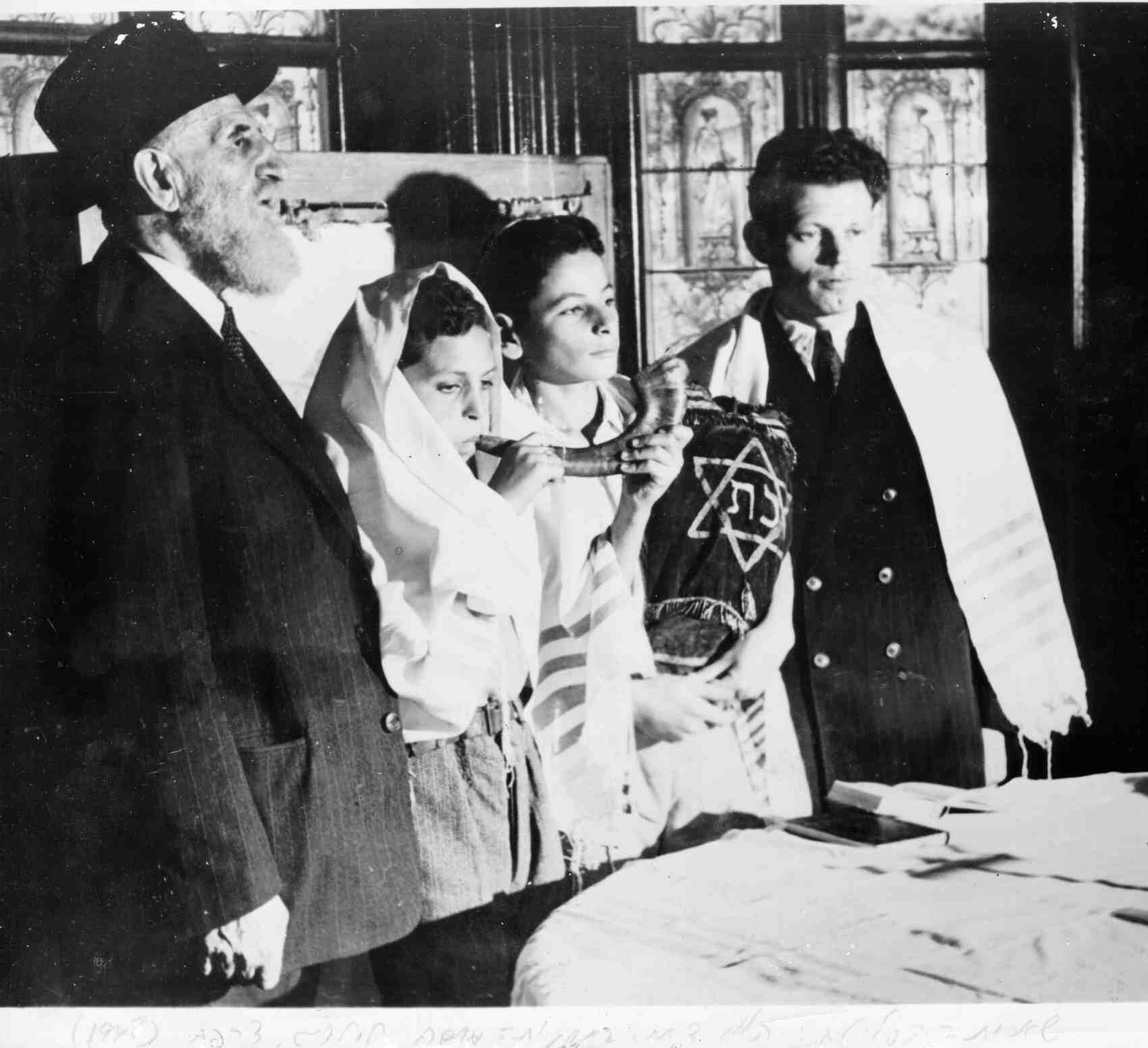
Surviving Jewish children in a shelter in France prepare for Rosh Hashana
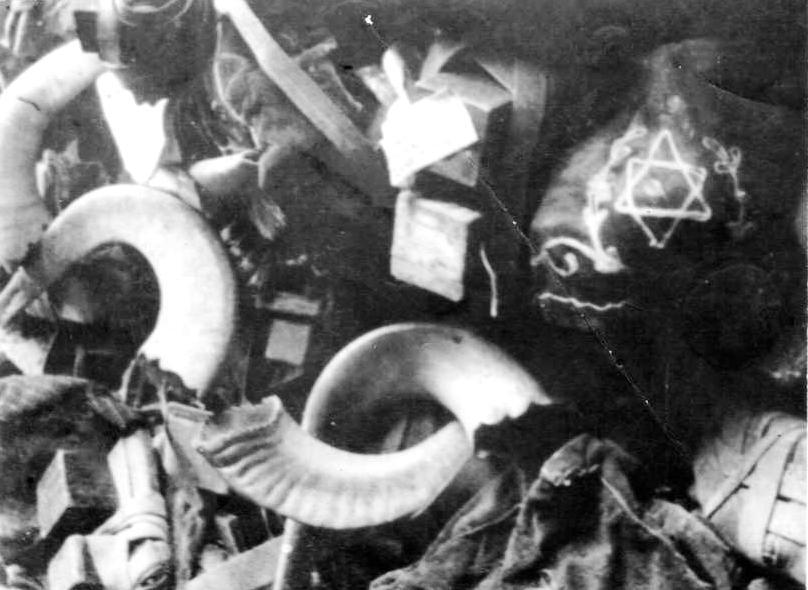
Shofars and Judaica thrown away in contempt
Rosh Hashana in a Besieged City
Rosh Hashana in a Besieged City
By: Rabbi Moshe Prager
It was twilight time on the eve of Rosh Hashana.
The Nazi army surrounded the capital city like a ring of fire. The bombings from above and the guns surrounding the city spit fire continuously and created death and carnage. However, in every cellar and in every shelter where Jews were, the same hour goes by with a rousing exclamation:
Jews, the holiday is sanctified, the time of prayer is imminent, Jews, to prayer!
The streets were all blocked. Different barricades near every corner. The sidewalks - split. At every step there were pits and ditches - traps for the enemy tanks and armored corps. Each house was a fortified citadel closed into itself.
The Jews gathered together, residents of every house for themselves, joined the minyans (prayer quorums) and prepared for the holiday prayers.
At the same time, the residents of the shelters were all shocked by the sound of a siren that filled the air.
The residents lost their senses and their ears were no longer sensitive to the sound of the siren. It was heard day and night. Along with the sound of the explosions, the siren heard itself and no one noticed it. But this time, in the evening, with the arrival of the new year, as if the siren had increased its power, its noise was prolonged and strengthened.
The city was burning.
The enemy rained thousands of firebombs and their flames rose like mountains of explosions. Clouds of fire penetrated the shelters and cellars and their occupants were left without air to breathe.
The equilibrium of the Jews of the besieged city was shaken. It was clear that ther was no way to hide from the fire. Even the deepest shelter did not protect its occupants. The flames and the suffocating smoke seeped through holes and cracks, gnawed and took down everything. In their confusion, the people began to leave their hiding places and shelters. However, when they stood outside, under the sky, their astonishment increased even more: there was nothing to be found! The entire Jewish quarter in the heart of Warsaw, the capital, was in flames.
That night Jewish Warsaw ceased to be a besieged city. Everything flowed out into the streets. Everything was deserted, as if there was no threat of bombs and shells facing them. In every hidden corner, in every shelter dug in the ground, death lurked no less than in the open air. No more darkening of the windows. What a hassle. Jewish Warsaw was illuminated by its flames, as if a sea of evil had shed its light on it.
The bad new spread with lightning speed from street to street, from yard to yard:
Dozens of Jewish houses were collapsing on their occupants! The bombed houses keeled over and buried their residents alive, who did not have time to escape!
Thousands of Jews, residents of besieged Warsaw, had their houses as their graves, and the skeletons of the houses, engulfed in fire, looked like terrible candles on freshly warm graves…
At the time of this hell, it was suddenly seen through the horror-soaked air, coming up from the turmoil of the soul:
Jews! Don't get distracted! Come to prayer! Come to the Rosh Hashana prayers!
It was a great prayer! A prayer that pierced and divided the seven heavens. A prayer, which tore the veil that separates the People of Israel from their Heavenly Father.
In the courtyards of the raging death, among the pillars of fire, smoke and soot, and among the falling walls of collapsing houses, dozens and dozens of trembling Jews joined in and poured out their hearts before G-d:
"Well, O Lord our God, place Your fear on all Your works and Your terror on everything you have created, and all Your works will be in awe of you and all creatures will bow down before You… and all condemnation will be consumed like smoke, because You will transfer a malicious reign from the earth…"
(Sparks of Glory, Rabbi Moshe Prager)
Edith Rothschild – Prayers in Auschwitz (Hungary)

Yehudit Hamdinger – The Yizkor Prayer with the Home in France for the “Children of Buchenwald”

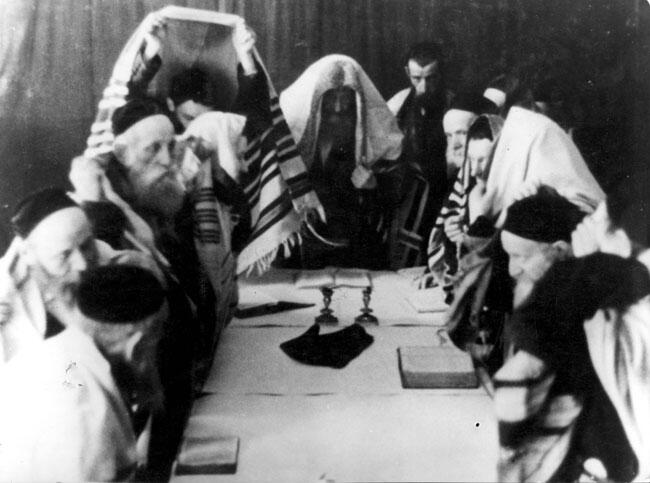
Yom Kippur prayers in a synagogue in the Krakow Ghetto, Poland
Yom Kippur Prayers in Plaszow with the Szydlower Rebbe
Yom Kippur Prayers in Plaszow with the Szydlower Rebbe
It was in the Plaszow horror camp, a place where forced labour and death were mixed together.
It was Yom Kippur, luckily we were working the night shift that day, so during the day we were free for prayers. The Rebbe of Szydlow was also imprisoned in our barracks and he served as our prayer leader.
We began to pray, with tears choking our throats, without machzors (prayer books) and without Torah scrolls, without prayer shawls and without the ark for the Torah, so destitute we stood conversing with the Creator of the world, asking that we be engraved in the Book of Life. The meaning of the words was engraved deep in our flesh; none of us knew when our turn would come for our last day.
The Szydlower Rebbe stood in front of us like an angel of G-d; his body was indeed present with us, in the Valley of the Shadow of Death, but it was evident that his elevated spirit wandered in the upper worlds. The fountain of tears burst forth in all of us, but the Rebbe's surroundings were difficult to describe; Around his place was a true puddle, the contents of which were his pure tears which he cried in supplication before the Master of the world. We began with a supplementary prayer and when we reached "U'Netaneh Tokef," a prayer that always brings great emotion, the emotions rose even stronger. "Like a shepherd controlling his flock" - we experienced this more than once, when we were in command and every tenth, fiftieth or hundredth would be taken to be killed…
The prayer overflowed and rose from within, but suddenly the rumour spread: "Finkelstein is here!". Finkelstein, the cruel kapo, a Jew who sold his soul to the devil, who did not hesitate to kill and massacre his fellow Jews, came to check what was going on in our barrack. As soon as we heard this, everyone went to sleep, in fear of the kapo.
I approached the Szydlower Rebbe and whispered to him "Finkelstein is here" - but it was as if I had said nothing. I repeated my words once and then twice, but I felt that I was indeed speaking only to flesh and blood, and that his lofty spirit was not by my side. I decided to stand by the Rebbe's side; am I better than him? What the kapo does to him, he will also do to me.
With great fear, I looked in the direction of the door, where the kapo was standing, watching the Szydlower Rebbe, and suddenly Helz, the same Jew who went down the steps, took out a handkerchief from his pocket and wiped away a hidden tear. "Macht weiter" - "Carry on" - he said, and silently left the place; we were saved.
(Testimony of Yosef Schiller, Ganzach Kiddush Hashem archive)
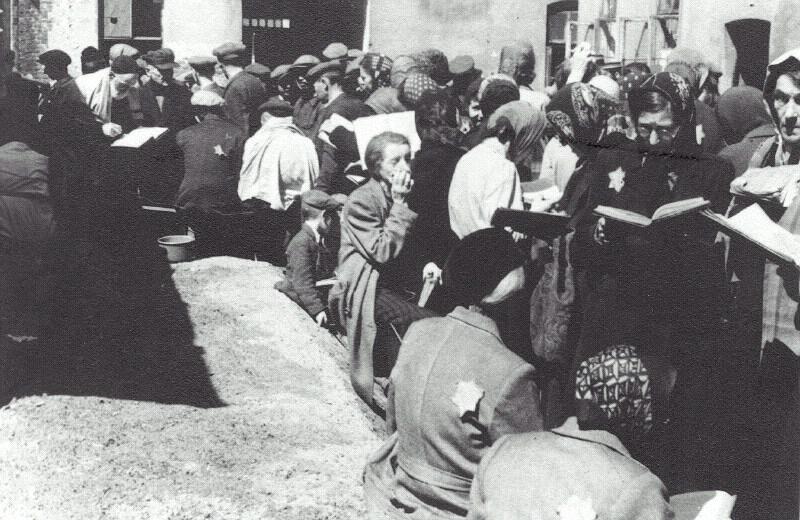
Yom Kippur prayers in the Lodz Ghetto
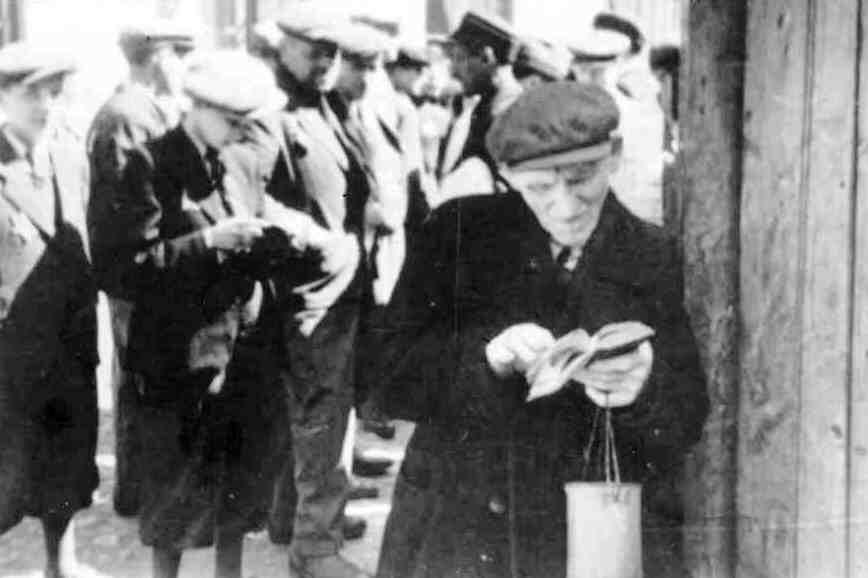
Yom Kippur prayers in the courtyard of the synagogue in the Lodz Ghetto
תפילה ותקיעת שופר בצריף הילדים
תפילה ותקיעת שופר בצריף הילדים
מרחוק נשמעו צעקות מן הצריף המסוגר. הילדים קוראים. מתקרב אחד שמה ושומע שהם מבקשים שיבוא הרב מייזלס, רבם, שלימד להם תורה במחנה. ניגש הרב לצריף - אם כי אסור בעונש מוות לגשת - שומע את הילדים מבקשים רק דבר אחד (אף על פי שזה יומיים לא אכלו):
"רבי, רוצים אנו לשמוע תקיעת שופר".
אסור בעונש מוות להיכנס לצריף, אבל הרב מוכן להיכנס. משחדים את השומר והוא נותן לרב מייזלס להיכנס לצריף, ואיתו שופר.
נכנס הרב ומביא איתו דברי עידוד. אין הרבה אשליות, אבל יש לו מאמר חז"ל: "אפילו חרב חדה מונחת על צווארו אל יתיאש אדם".
אבל אחד הילדים מתפרץ: "עלינו להיות מוכנים לגרוע היותר. היו מוכנים. אמרו וידוי. אמרו "שמע ישראל" ושמעו בפעם האחרונה תקיעת שופר.
והרב מתחיל: "מן המיצר קראתי..." והילדים עונים אחריו מילה במילה, פסוק אחרטי פסוק. פורץ בכי איום. והרב בוכה אף הוא. מעולם לא אמרו יהודים "מן המיצר כזה" זו הפעם האחרונה. והילדים מתייפחם והרב תוקע בשופר. התקיעות האחרונות: תקיעה, תרועה, שברים.
ביום שני של ראש השנה הוליכו את הילדים לתאי הגז. והם הלכו ושרו: "וטהר לבנו".
מתוך: יומן גטו ורשה / הלל זיידמן, עמ' 271
Yosef Schiller – Yom Kippur in the Plaszow Camp (Krakow, Poland)

Yaakov Leibowitz – A Handwritten Rosh Hashana Machzor (Prayer Book) (Poland – Siberia, Russia)

Shaindy Miller - Yom Kippur in Birkenau (Hungary)














































































